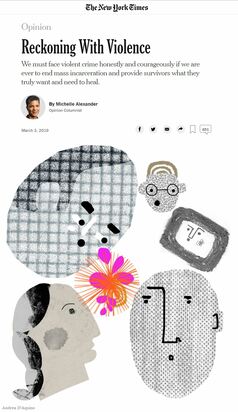 Great mention of Insight Prison Project by Michelle Alexander in the New York Times on Sunday. Thank you to all our volunteers, in 25 prisons nationwide, who make this work possible and to our brothers and sisters behind the walls committing themselves to making changes. "Hurt people, hurt people. Healed people, heal people," as stated by Paulette Brown and Maddie Scott from the San Francisco Healing Circle for the Soul Support many years ago at San Quentin. Help us help the men and women inside to heal themselves and then heal those around them. https://www.nytimes.com/2019/03/03/opinion/violence-criminal-justice.html
8 Comments
Jennifer Siebel Newsom returned to San Quentin State Prison this August. Siebel Newsom previously entered San Quentin two years ago, with cameras and microphones, as she was there to film a group of prisoners for her documentary, The Mask You Live In.
At the invitation of Insight Prison Project, Siebel Newsom came back to screen the finished product for an eager audience that consisted of outside guests and prisoners of San Quentin, the “Men in Blue.” Newsom wrote, directed and produced the film, which “follows boys and men as they struggle to stay true to themselves while negotiating America's narrow definition of masculinity.” Experts in neuroscience, psychology, sociology, sports, education, and media are also interviewed and provide empirical evidence of the negative consequences of gender stereotypes and how increased hyper-masculinity is impacting society at large. Insight Prison Project’s Executive Director, Billie Mizell, opened the evening and took the opportunity to honor IPP's “small but mighty” staff, dedicated and invaluable volunteers, longtime supporters (many of whom were in the room), and the Men in Blue who dedicate hours each week to the hard work of Restorative Justice and personal transformation. Also in attendance was the filmmaker’s husband, Lt. Governor Gavin Newsom, as well as District Attorney George Gascon and his wife Fabiola. Members of San Francisco’s Anti-Defamation League (ADL) also joined, and Shaun Kozolchyk of the ADL was thanked as having been instrumental in organizing the unique experience. The prisoners in attendance were members of various IPP programs, including the Victim Offender Education Group (VOEG), Acting with Compassion and Truth (ACT), and KidCAT (a group of men given life sentences as teenagers who are now committed to Creating Awareness Together). Mizell then invited “the tireless advocate and movement builder” Jennifer Seibel Newsom to the stage to introduce her film. Seibel Newsom said that the spark for her latest documentary came as she was traveling the world with her first film, the highly acclaimed Miss Representation, which explores how American media has contributed to the under-representation and exploitation of women. “As I traveled with Miss Representation, I heard the same question over and over again, ‘But what about our boys? Isn’t there a boy crisis going on? And, how can we help our boys be part of the solution instead of the problem?’” Siebel Newsom said. Having just given birth to her first son, the filmmaker was inspired to dig deeper for answers. The film screening at San Quentin was followed by a Q&A panel that was moderated by Mizell, and included Siebel Newsom and several of San Quentin’s prisoners. Each Man in Blue stood and introduced himself, named his crime, and stated how long he had been incarcerated and how old he was when he came to prison. All of the panelists had arrived at prison before they were old enough to legally buy a beer—one had been incarcerated since he was 14 years old. Most of the men had been in prison longer than they had lived outside the walls; The longest serving prisoner on the panel was in his 41st year of imprisonment. The audience was buzzing with thoughtful questions. The panelists did not hold back with their answers. One man talked about how he had allowed his mask to become a cocoon, covering himself in tattoos that told the world he was not a tolerant person. But through his participation and hard work in the programs that IPP makes possible, he transformed into a man who thoughtfully works side by side with his fellow prisoners, including those who are transgender and/or of a different race. The panelists uniformly agreed that the film spoke the story of their lives—that, in fact, the same culturally indoctrinated characteristics explored in the film were those that the men had felt beholden to when they committed their crimes. Quite a few were drawn to personally thank Siebel Newsom for making the film and giving a voice to the struggles of young men in America. After the panel, one man said that the film was very hard to watch because it really hit home, and then he added, “There are over two million men in American prisons. They were all little boys once. I hope all the young men out there see this movie and have the courage to take off that mask.” One visitor, who had seen the film before, said that it took on a whole new meaning, and a whole new importance, after viewing it inside a state prison, surrounded by incarcerated Men in Blue. Everyone seemed to agree it was a special and thought-provoking experience. Many said that they wished all prisoners could watch The Mask You Live In. Before leaving San Quentin, Jennifer Siebel Newsom gave the prison permission to show the film again so that every Man in Blue at San Quentin would have an opportunity to see it. Reader's Digest has published the story of Patty and Siobhan O'Reilly, who have been part of the IPP family for a dozen years. Patty was the first surrogate survivor speaker for our Victim/Offender Education Group over a decade ago, and Siobhan was the inspiring survivor speaker at the last annual Beyond the Bars celebration. The O'Reilly family's journey with Insight Prison Project began with a card Siobhan made, complete with a panda sticker, when she was just 8 years old.
The Center for Volunteer and Nonprofit Leadership (CVNL) recently hosted a ceremony to present the Heart of Marin Awards and a longtime IPP champion, Harriet Whitman Lee, was selected as The Volunteer of the Year!
An inspiring 145 Californians were nominated for an award from CVNL and 890 community leaders, local dignitaries, business members, and other volunteers filled the Marin Civic Center for the awards presentation. Harriet's story brought them all to their feet for a thunderous standing ovation! The sponsor for the award was Redwood Credit Union and IPP received a $5,000 donation in Harriet’s honor to help us continue the work she so generously supports. Below you can read the full text of the nomination IPP completed on behalf of our beloved Harriet. On his second appearance before a parole board, Jose Segura was given a release date. He attributes this success to being able to express himself clearly through what he learned in the Spanish Victim Offender Education Group (VOEG).
VOEG is a program that puts offenders and victims of crime in dialogue so they can discuss the impact of crime on families and communities. “When I committed my crime, I had a belief system called machismo. This belief system taught me to have a big ego, be tough, never ask for help or let another man push you around,” Segura said. “VOEG helped me see and transform the rage inside of me. I learned that asking for help or expressing my emotions is acceptable. It’s not something that makes me weak.” Lucia De La Fuente impacted the lives of 10 Spanish-speaking San Quentin prisoners with her skills as a counselor and teacher.
“She taught me how to deal with my traumas. I can own up to my crime and hold myself accountable for it,” said Manuel Murillo, one of her students. De La Fuente is one of three volunteers that recently launched Victim-Offender Education Group (VOEG) for Spanish-speaking prisoners. “It’s the other Spanish facilitators like her that are essential and important to help me express my feelings and emotions. It’s not only a change for me; it’s a change for everyone in the group. Now I have more confidence,” Murillo added. VOEG is a self-help program inside San Quentin that adopts restorative justice practices to find healing for both offenders and survivors. “This program is about forgiveness and accountability. They go together,” said De La Fuente. “It’s about being accountable for the harm and forgiveness and it is about being accountable for the good they’ve done. Everyone has a different process for forgiveness. Greater Good: The Science of a Meaningful Life
By Jill Suttie | June 9, 2015 The Insight Prison Project helps incarcerated men learn new emotional skills in order to succeed in and out of prison. But it can also help crime survivors. A dozen men sit in a circle. Some are old and some are young. A facilitator asks each one to check in with the group about how they are feeling emotionally, physically, or spiritually. Sometimes a man tears up with emotion as he talks. The others listen, offering nods of support or asking clarifying questions. It sounds like a typical men’s support group—until you know these men are all prisoners incarcerated at San Quentin Prison. This is a Victim Offender Education Group (or VOEG), an outgrowth of a movement that aims to help people who’ve committed crimes take responsibility for the harm they’ve caused others and to make amends to the victims of crime and their community. Operating within the criminal justice system as an alternative to punishment alone, these “restorative justice” programs help prove that personal transformation is possible, even for people who’ve committed the most serious crimes. To read the complete article 'Can Restorative Justice Help Prisoners to Heal?' on the Great Good website, please click here. The August 2014 issue of the San Quentin News (www.SanQuentinNews.com) highlights a recent ABC News report that repeat offender numbers in Australia are down as much as 55 percent, thanks to restorative justice proceedings. Restorative justice entails mediated sessions between offenders and victims and/or friends and families of victims, to generate empathy and process the trauma of the crime.
The article also highlights Insight Prison Project's Victim Offender Education Group (VOEG) program inside San Quentin State Prison. The Victim Offender Education Group (VOEG) program supports incarcerated individuals in the process of understanding and developing insight into the underlying circumstances of their lives and the choices that led them to come to prison. The process utilizes a Restorative Justice philosophy to help individuals to address memories and feelings connected to traumatic and unresolved events in their lives in an effort to integrate these experiences into their lives and experience a renewed sense of wholeness, authenticity, emotional well being and positive behavior. 'Reports Show Restorative Justice Programs Prove Effective' Dear Friends,
It is with great pleasure that I greet you as the new Interim Executive Director of Insight Prison Project. I am looking very forward to working with the extraordinary staff, volunteers, donors, and stakeholders of this remarkable organization. I have been on the Board of Directors of IPP for almost two years now, and the Board's Chair/President for most of that time. This has been among the most rewarding work of my life and I am honored to be trusted with this new role for the organization. I am following in the footsteps of Ellen Barry--a MacArthur Genius winner and a former Nobel Peace Prize nominee--so I know I have some big shoes to fill. I am very pleased Ellen will continue to be a part of the IPP family. She remains committed to the work of Insight Prison Project and ensuring a smooth transition and bright future for the organization. |
Archives
March 2019
Categories |

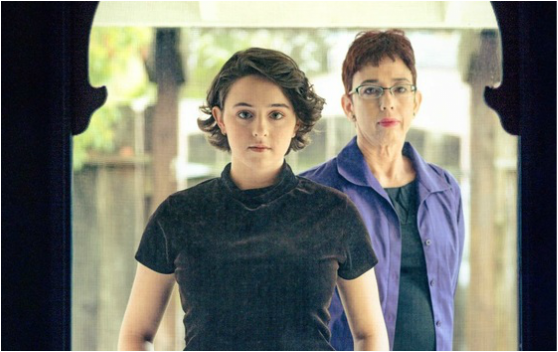
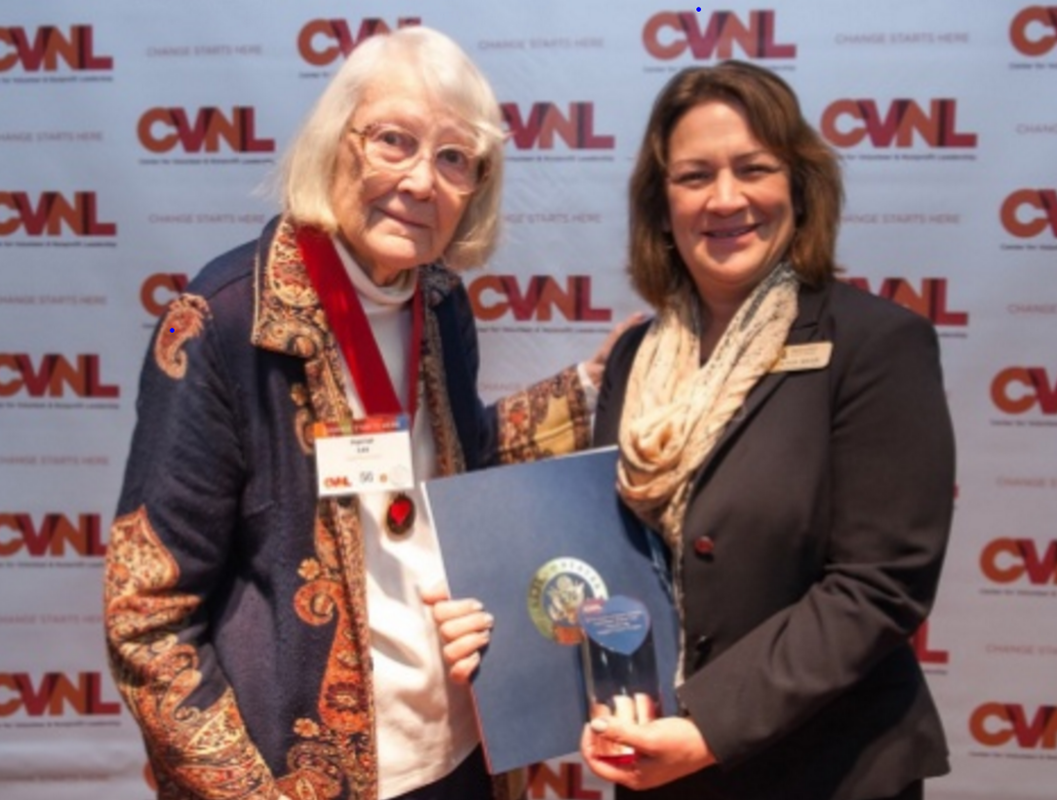
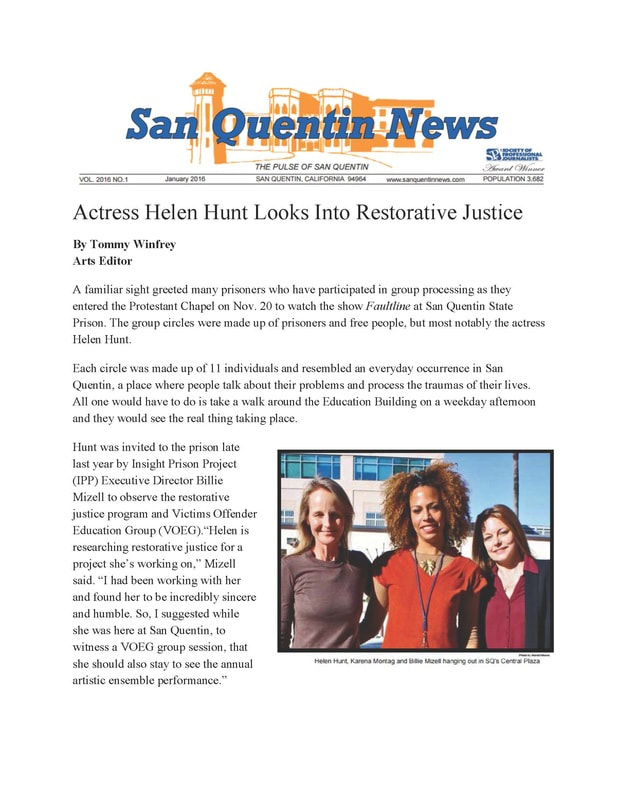
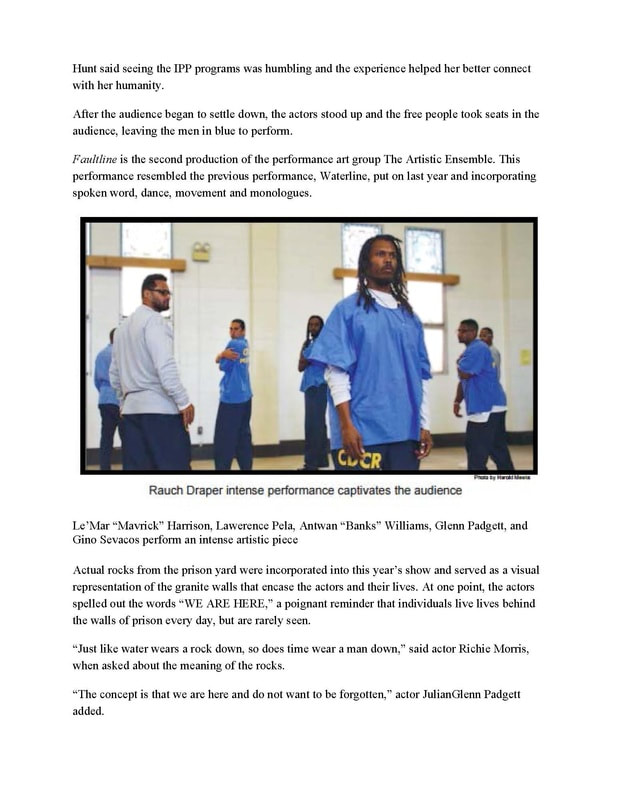
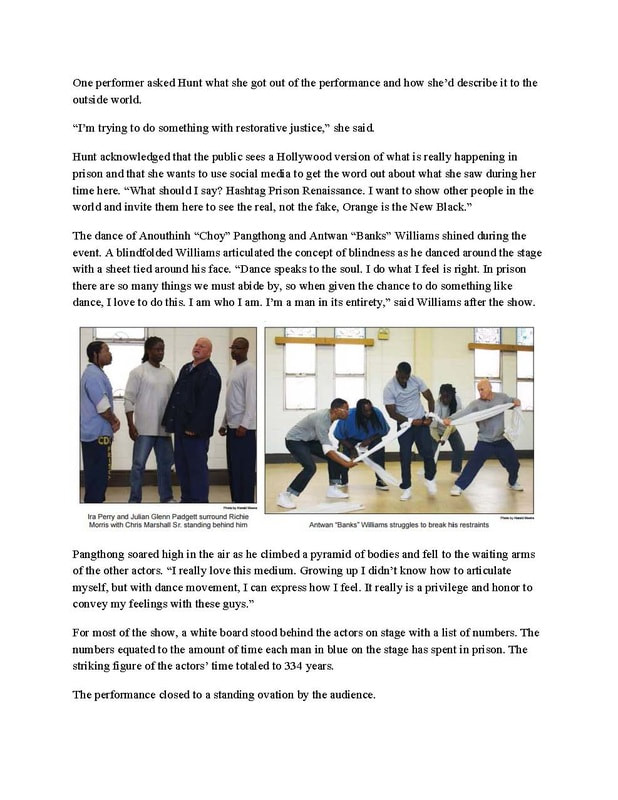
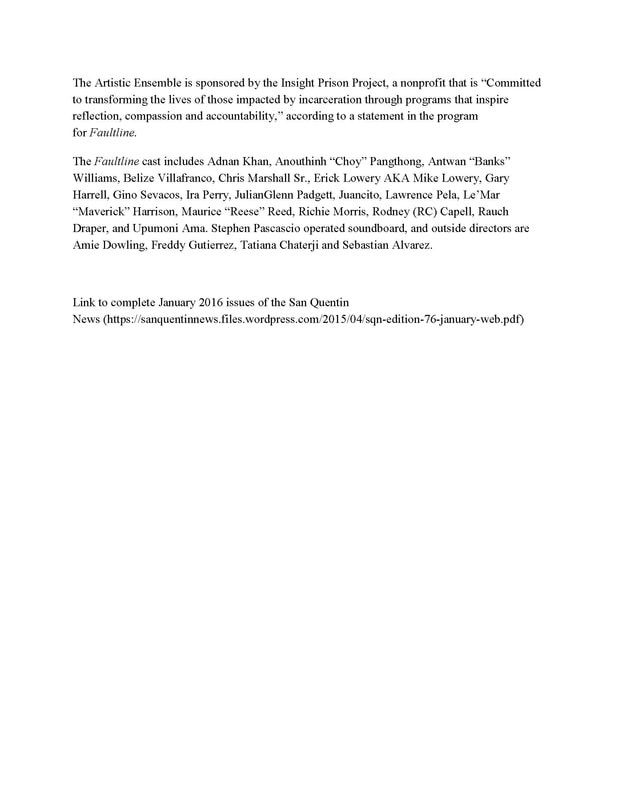
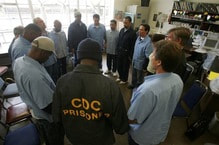
 RSS Feed
RSS Feed
